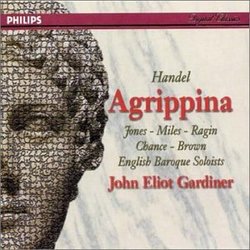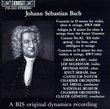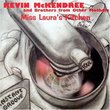| All Artists: George Mosley, Jonathan Peter Kenny, Anne Sofie von Otter, English Baroque Soloists Title: Handel - Agrippina / D. Jones, A. Miles, Ragin, Chance, Brown, J. P. Kenny, von Otter, EBS, Gardiner Members Wishing: 0 Total Copies: 0 Label: Polygram Records Release Date: 4/15/1997 Genre: Classical Styles: Opera & Classical Vocal, Historical Periods, Baroque (c.1600-1750) Number of Discs: 3 SwapaCD Credits: 3 UPC: 028943800921 |
Search - George Mosley, Jonathan Peter Kenny, Anne Sofie von Otter :: Handel - Agrippina / D. Jones, A. Miles, Ragin, Chance, Brown, J. P. Kenny, von Otter, EBS, Gardiner
 | George Mosley, Jonathan Peter Kenny, Anne Sofie von Otter Handel - Agrippina / D. Jones, A. Miles, Ragin, Chance, Brown, J. P. Kenny, von Otter, EBS, Gardiner Genre: Classical
|
Larger Image |
CD DetailsSimilar CDs |
CD ReviewsAn essential recording Daniel A. Swick | 03/19/1999 (5 out of 5 stars) "This recording is a real countertenor tour de force. If it contained nothing but Michael Chance, it would still be worth your money. Chance outdoes himself. His singing as Ottone is of the highest order: his timbre is glowing, his falsetto is evenly produced, his intonation is exceptional. The recitative-aria "Otton, qual portentoso fulmine...Voi che udite" is unfogettable. Chance delivers the difficult runs and trills in this aria with flawless legato, impeccable breath management and wrenching emotion. His rival Drew Minter on the McGegan recording of Agrippina just doesn't measure up. Minter is an intelligent singer who sings "Voi che udite" with some very attractive embellishments, but in the end Chance clearly comes out as a winner (Minter also could have used some advice on his Italian pronunciation - but no such charge could be levelled against Chance). The cast on the McGegan recording, while worthy, is not as strong as here. The Gardiner Agrippina is the one to have. In fact, it is a must. P.S. The stellar cast here also includes the amazing "soprano" countertenor Derek Lee Ragin as Nerone. If you are like me, you will always prefer a male falsettist to a female mezzo in a male role." Jones and Miles are fantastic Daniel A. Swick | 10/02/2001 (4 out of 5 stars) "I'll stay out of the pro/contra countertenor argument- I am by far most impressed with Della Jones and Alastair Miles. They sing their music magnificently, not just with generally impeccable technique but with as much drama as any Verdi opera. No boring stand and sing baroque nonsense with these two. Miles has a big, rich, incisive, gorgeous basso that could sing Verdi, yet has no trouble with the coloratura. Beautiful diction and full understanding in the delivery of his recitative (Donna Brown deserves credit in this area as well).It is almost needless to say, but Della Jones delivers her usual hgihly involved, totally committed performance with complete conviction. Every word from scheming Agrippina is invested with meaning- when do baroque recitiatives (which can be so tiresome) sound this exciting? Her arias could hardly be better sung, with beautiful line in her slow solos and accuracy at high speed in the fast coloratura. Nothing is tossed off as mere display- she sacrifices tone for dramatic expression, but just a couple of times. A real tour de force for Jones, and more justification for my impulse to buy any recording with her name on it without having to hear it first." An wonderful recording of this important opera that set Hand Craig Matteson | Ann Arbor, MI | 10/31/2005 (5 out of 5 stars) "Some believe that it was the brilliance of this opera that led to Handel being invited to London. Handel was reluctant to write because he didn't see any advantage to doing all that work. However, he was persuaded and set it to a brilliant libretto by Vincenzo Grimani. Apparently the entire opera was written in only a few weeks. Some dispute this because of the quality of the writing, but contemporary testimony and Handel's fast work habits lead others to believe this accomplishment to be true.
Beyond the names, general moral depravity, and a broad historical shape, this is not an historical story. Some see it as simple a comedy of courtly manners, but others see some sly commentary on the War of Succession that was then ongoing. When Charles II died he bequeathed the crown to Phillip V much to the consternation of Leopold I, the Holy Roman Emperor, who wanted to maintain his territory intact. In this opera, Claudius names Otho his successor much to the consternation of Agrippina. The opera opens when Agrippina receives news that Claudius has died at sea. She seizes the opportunity to advance her son, Nero, to be named Emperor. However, just before he can be crowned, Claudius arrives. He had been saved by Otho and in gratitude named him his successor. Agrippina cannot confront him directly but uses her knowledge of Claudius and his lust for Poppea to spring her trap and it almost works. Poppea is a beauty who trades on that, but if she cares for anyone it is Otho, but she cannot deny the Emperor. It also turns out that Nero has improper desires for her as well. It is Nero's chasing her that actually undoes Agrippina's plan, but in the end all works out. Agripina gets her son names to the throne, Poppea gets Otho, and Claudius gets some peace and quiet. The music is marvelous. It is important to remember that opera was only a century old at this time; about the same distance from the beginning of football or maybe basketball to our present time. Certain aspects of the recitative and aria had certainly been developed and made more brilliant, but there was much left to explore in the form. Handel added a great deal to the expressiveness and character development in his creative use of music appropriate to the character, for example Claudius is given wide leaps and musical lines the emphasize his clumsy and awkward qualities. These are qualities Handel develops over his career writing dozens of brilliant operas. In this opera the roles of Nero, a boy still learning evil from his mother, was written for a castrato, but sung here by the brilliant countertenor Derek Lee Ragin. Otho was originally written for a woman, but sung here by the terrific countertenor Michael Chance. Agrippina is given all her devious splendor by Della Jones, and Poppea's beautiful shrewdness by Donna Brown. Claudius requires a very special bass voice that can plumb the depths down to the C below the staff and Alistair Miles is simply wonderful in the role. This is a treasure of a recording of a very important opera to Handel's career. Starting with "Rinaldo" Handel wrote more brilliant operas, and others that were more subtle. However, this was the one that got him the attention that set him on the course of fame and history." |

 Track Listings (25) - Disc #1
Track Listings (25) - Disc #1



